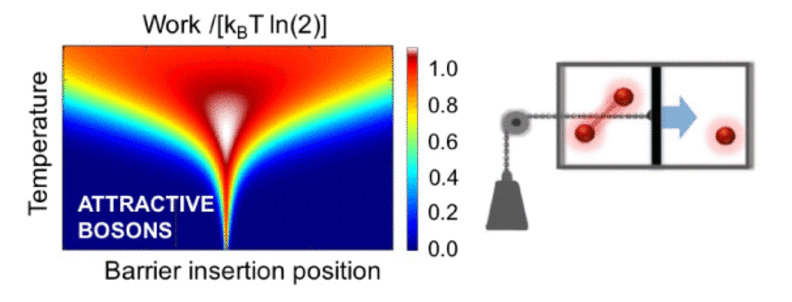Nanothermodynamics
We employ quantum thermodynamics to develop new paradigms for energy conversion and quantum devices at the nanoscale, where thermal and quantum fluctuations may conspire to profoundly alter the physical properties. We set focus on interacting few- or many-particle quantum systems where effects of quantum correlations, fluctuation statistics and quantum coherence lead to fundamentally new physics when reaching truly microscopic sizes far from the thermodynamic limit.
Research areas:
Thermoelectrics and hot carriers
Thermoelectricity uses a heat gradient in an electronic material to generate an electric current.
Nanoscale phenomena, such as energy filtering and a modified density of states in quantum dots or quantum wires, can be used to enhance the efficiency of thermal-to-electric energy conversion up to the Carnot limit. We explore and realize the fundamental limits of thermoelectric energy conversion. We also apply our insights to harvesting energy form non-equilibrium electrons, for example hot electrons in solar cells. In the long term, we aim to contribute to a sustainable society based on renewable energy.
Making use of fluctuations
The energetics of small systems, such as macromolecules or nanoelectronic systems, is in many ways different compared to macroscopic systems. For instance, systems on the micro- or nanoscales can exhibit substantial fluctuations in energy that must be considered in their thermodynamic descriptions. In systems driven out of equilibrium, fluctuations can even give important insights into the equilibrium properties of the systems. Stochastic thermodynamics is a relatively new branch of thermodynamics that provides a framework for the energetics of non-equilibrium small systems. We are aiming to develop a stochastic thermodynamics framework for (opto-)electronic devices, and to identify new, highly efficient ways of nanoscale energy conversion. We also combine theory and experiment to study fluctuation-driven transport phenomena in nanoelectronic systems.
Quantum thermodynamics
Quantum Thermodynamics offers a novel perspective on the foundations of Statistical Mechanics and provides new tools to analyze, model and design nano-scale systems where quantum fluctuations strongly affect the physical properties. Harnessing quantum superposition and correlations for an improved performance of energy harvesting and conversion is an outstanding challenge in the field. Moreover, knowledge of Quantum Thermodynamics is of key importance to nanoscale and quantum information processing, where state read-out and initialization leads to information erasure, causing dissipation of energy. We are investigating fundamental properties of heat flow, work production and generation of entropy in quantum systems. We also combine theory and experiment to analyze quantum thermal machines operating at the nanoscale.
Key publications
- Debbarma, R. et al. Effects of Parity and Symmetry on the Aharonov–Bohm Phase of a Quantum Ring. Nano Lett. 2022, 22, 1, 334–339
- Dorsch, S. et al. Heat Driven Transport in Serial Double Quantum Dot Devices. Nano Letters. 21, 2, p. 988–994
- A quantum-dot heat engine operating close to the thermodynamic efficiency limits M. Josefsson, A. Svilans, A.M. Burke, E.A. Hoffmann, S. Fahlvik, C. Thelander, M. Leijnse, and H. Linke. Nature Nanotechn. 13, 920–924 (2018). See article quantum-dot heat engine at the publisher's site
- Quantum Szilard Engine with Attractively Interacting Bosons J. Bengtsson, M. Nilsson Tengstrand, A. Wacker, P. Samuelsson, M. Ueda, H. Linke, and S. M. Reimann. Phys. Rev. Lett. 120, 100601, (2018). See article quantum Szilard engine at the publisher's site
- Detailed Fluctuation Relation for Arbitrary Measurement and Feedback Schemes P.P. Potts, P. Samuelsson. Phys. Rev. Lett. 121, 210603 (2018). See article detailed fluctuation relation at publisher's site
Contact persons:
Additional reading
Review on Stochastic thermodynamics by Udo Seifert, Eur. Phys. J. B, 64 (2008) 423-431



